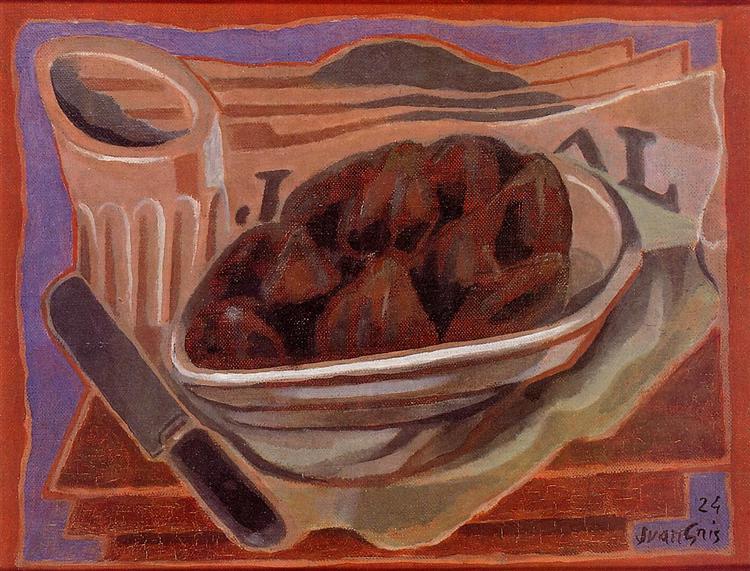描述
The work "Figs" by Juan Gris, created in 1913, stands as a testimony to the artist's mastery in the field of cubism, a movement of which he was one of its most prominent exponents. In this painting, Gris takes abstraction to a level where form and color coexist harmoniously, establishing a dialogue that allows the viewer not only to observe, but also to interpret the essence of the objects portrayed.
In “Figs,” the composition revolves around the representation of a fruit bowl with figs, an element that, although simple and everyday, becomes the vehicle for exploring the relationship between form and space. The figs, with their characteristic purple tones and complex texture, are represented in a stylized manner, highlighting Gris’s ability to break down and reorganize visual reality. The use of angular lines and superimposed planes reveals the influence of geometry, a predominant characteristic of Cubism. This fragmentation, far from disorienting, allows for a rich and multidimensional reading of the work.
Colour in Figs is fundamental to the creation of atmospheres and emotions. Gris employs a balanced palette where warm tones predominate, with variations of browns, yellows and purples, creating a strategic contrast that adds depth to the composition. The light seems to flow through the scene, subtly illuminating the figs and generating shadows that reinforce the three-dimensionality. The use of colour is also a manifestation of Gris' personal character, who allows himself to experiment within the restrictions imposed by Cubism.
Another interesting aspect of the work is the way Gris incorporates his cultural heritage and personal experience into his art. Born in Spain and later settled in Paris, the artist fuses influences from his Mediterranean surroundings with the innovations of intellectual cubism. This is reflected in "Figs" not only in the representation of still life, but also in the way he reclaims the beauty of everyday life through an abstract approach.
Although there are no characters in the painting, the presence of figs evokes an intimate and symbolic relationship with nature and everyday life, transforming the trivial into something meaningful. In this sense, "Figs" can be seen as a tribute to life, at a time when the artistic avant-garde was beginning to look for new ways of connecting with the real world.
The analysis of “Figs” is not limited to its superficial appearance; it is, in essence, a dialogue between the object and the viewer, an invitation to unravel the layers of meaning in the visual experience. The work is a reflection of Gris’s constant search to find the balance between abstraction and representation, a challenge faced by many artists in the Cubist context. Through its technique and originality, “Figs” continues to resonate in the contemporary art scene, marking a clear example of how an everyday object can be elevated to the category of art through the singular vision of a master.
In conclusion, "Figs" is not only an expression of Juan Gris' technical skill, but a work that encapsulates the fusion between art and life, realism and abstraction. Its apparent simplicity hides a complexity that invites the viewer to explore beyond the surface, reaffirming the relevance of Cubism as a fundamental pillar in the history of modern art.
KUADROS ©, a famous painting on your wall.
Hand-made oil painting reproductions, with the quality of professional artists and the distinctive seal of KUADROS ©.
Painting reproduction service with satisfaction guarantee. If you are not completely satisfied with the replica of your painting, we will refund 100% of your money.

